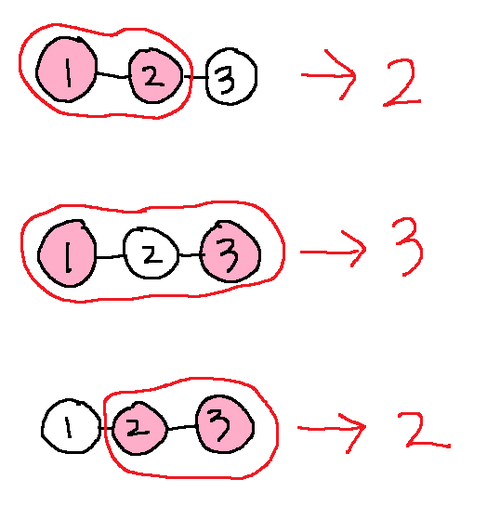Home
Contest: Task: Related: TaskE TaskG
Score : $1900$ points
Problem Statement
One day, Takahashi was given the following problem from Aoki:
- You are given a tree with $N$ vertices and an integer $K$. The vertices are numbered $1$ through $N$. The edges are represented by pairs of integers $(a_i, b_i)$.
- For a set $S$ of vertices in the tree, let $f(S)$ be the minimum number of the vertices in a subtree of the given tree that contains all vertices in $S$.
- There are
 ways to choose $K$ vertices from the trees. For each of them, let $S$ be the set of the chosen vertices, and find the sum of $f(S)$ over all
ways to choose $K$ vertices from the trees. For each of them, let $S$ be the set of the chosen vertices, and find the sum of $f(S)$ over all  ways.
ways. - Since the answer may be extremely large, print it modulo $924844033$(prime).
Since it was too easy for him, he decided to solve this problem for all $K = 1,2,...,N$.
Constraints
- $2 ≦ N ≦ 200,000$
- $1 ≦ a_i, b_i ≦ N$
- The given graph is a tree.
Input
The input is given from Standard Input in the following format:
$N$
$a_1$ $b_1$
$a_2$ $b_2$
$:$
$a_{N-1}$ $b_{N-1}$
Output
Print $N$ lines. The $i$-th line should contain the answer to the problem where $K=i$, modulo $924844033$.
Sample Input 1
3 1 2 2 3
Sample Output 1
3 7 3

The diagram above illustrates the case where $K=2$. The chosen vertices are colored pink, and the subtrees with the minimum number of vertices are enclosed by red lines.
Sample Input 2
4 1 2 1 3 1 4
Sample Output 2
4 15 13 4
Sample Input 3
7 1 2 2 3 2 4 4 5 4 6 6 7
Sample Output 3
7 67 150 179 122 45 7